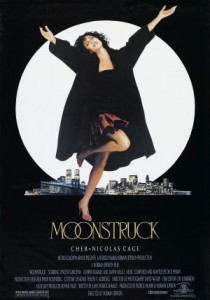

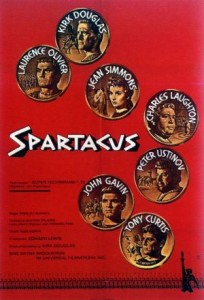
Moonstruck (1987, Norman Jewison) – 6.1
A bit shaky, but gets the job done better than most straight rom-coms do. No single character is particularly likeable or worthy of much sympathy, but the cumulative force of this high-strung family coalesces and brought a lump to my throat. As Shanley himself put it, it makes the idea of ‘justice’ out to be the most damning thing to ever happen to the idea of ‘family’. If these people tried even a little to judge each other based on what they all actually deserved, there would be no hope or love left for any of them. If that all sounds a bit too Sister Sledge for its own good, it’s because it is.
The Myth of the American Sleepover (2010, David Robert Mitchell) – 5.8
Just checking to see when this film is supposed to take place, and all (lack of) information suggests that it’s set in the present. I get that it’s probably aiming for a timeless quality or nostalgia, but the absence of cell phones and internet in the lives of these couple dozen upper-middle class teenagers is distractingly anachronistic, missing an opportunity to really take a glance at how adolescent social spheres are shaped in 2010. Mixing signals about the setting even further was the ambiguously non-diegetic incorporation of Beirut’s ‘Elephant Gun’ during a leisurely bike ride, which suggested a relation to modern day twee-ness. This isn’t to say that I need historically accurate coordination between soundtracks, settings, and subjects (House of Tolerance confuses these traits to euphoric effect). What it seems to be doing, strictly, is reminiscing about a particular childhood activity that doesn’t carry over into adulthood, for whatever reason, and evoking the hazy identity crises that correspond to that period in life. What this results in is a well-observed yet light-as-a-feather depiction of kids’ fickle feelings and ill-advised decisions. Would this have greatly benefited from representations of some non-suburbanite, middle-to-upper-middle class characters? Probably (I really have to try to forget how enraged I would be if I were a lower-class teen watching this film). And we’re possibly still at the stage where an appearance from twitter, facebook, texting, etc. would be too swaying toward that ‘topic’, but a coming-of-age film that is about such a generic activity is deprived of a much-needed edge (and the dubious morality of Scott’s crush on the Abbey twins is not the kind of edge I’m talking about).
Spartacus (1960, Stanley Kubrick) – 6.6
Well, I guess I can like a film with a gigantic clash of huge armies a bit more than Lawrence of Arabia, after all. I still think – as I did with Lawrence – that the big battle is overwrought and noisy filler that makes the post-intermission stretch significantly less affecting than the masterful set-up, but the writing is so sharp and the scope so rhapsodic for the entire duration that it ends up wowing more often than not. The second half is also laced with scenes of poignance that border on excess schmaltz – the ‘I’m Spartacus’ bit; the reunion with Varinia; the final scene – that are rousing but with a heavy-handed precision that is slightly aggravating, where the earlier moments (there are many in the gladiator training stages, a majority contained within a single Kirk Douglas gaze) achieve a greater weight because of their modesty.
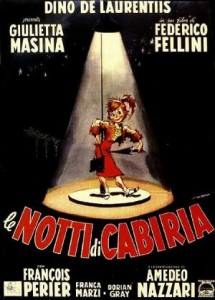
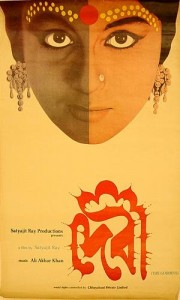
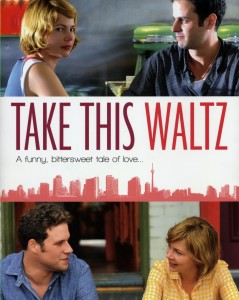
Nights of Cabiria (1957, Federico Fellini) – Inc.
I walked into the theatre anywhere from 5-10 minutes after the movie started (the TIFF Bell Lightbox usually starts evening screenings at 6:30, but today they scheduled it for 6:15; I will have to look at every ticket from now on), so I had no idea if/how what I’d missed would impact my reading of the 95% of the movie I was watching (having just seen those first 5-10 minutes online, I’m aware that my experience would have been significantly different, especially how I responded to the ending). It’s not even worth trying to say anything else.
The Goddess (1960, Satyajit Ray) – 7.8
Affecting in a myriad of ways – the male sense of displacement when a woman leapfrogs (literally) overnight into a position of superiority; a marriage crisis drama, in which one partner becomes aware that he/she can do more with his/her life, but only without the other partner; most directly, a caustic portrait of withering psyches after they’ve become obsessively idolatrous. It’s a perfect balance, then, of personal, political, and religious turmoils without overselling any one theme. That it accomplishes this in lusciously framed compositions in shimmering black & white photography (this was one of the few instances where the idiom ‘the silver screen’ was entirely justified) is just spoiling us.
Take This Waltz (2011, Sarah Polley) – 4.8

I doubt Mitchell would admit it, but my sense is that to the extent AMERICAN SLEEPOVER is set in the present that’s entirely for budgetary reasons. He’s clearly attempting to depict his own adolescence in the ’80s, and I imagine the film plays better for viewers my age who are more likely to recognize their own experiences. I found it refreshing not to be distracted by period detail, even though I enjoyed that element of SUPER 8 more than the story.
Yeah, the more I thought about it the more I’ve begun to like the discrepancies between their lifestyles and what I perceive to be the lifestyles of today’s teens. Mitchell comments on the changes I was looking for (re: phones, internet, etc.) simply by letting them be absent. The main issue remaining for me is that, like Malick’s vision of his own childhood, the world he shows just seems way too ordinary and universal.